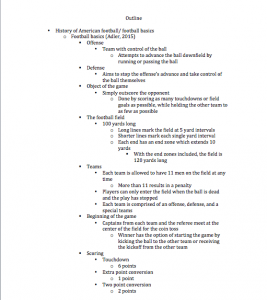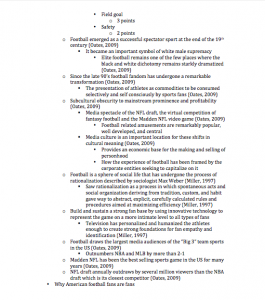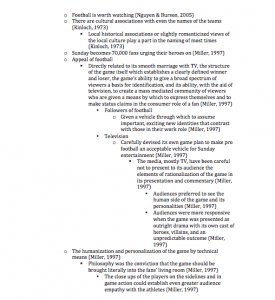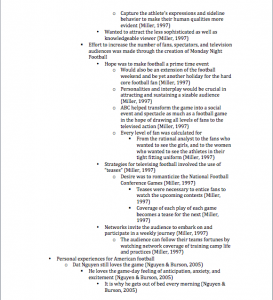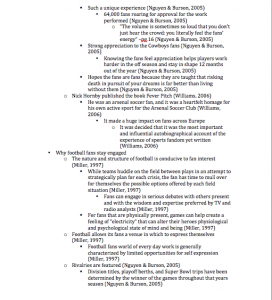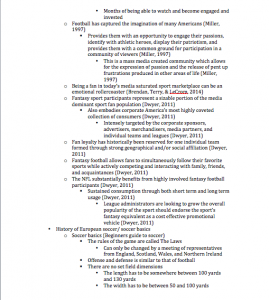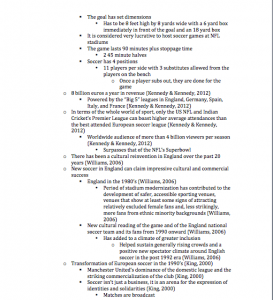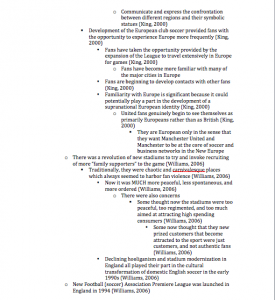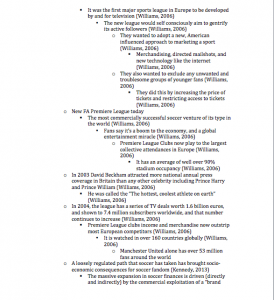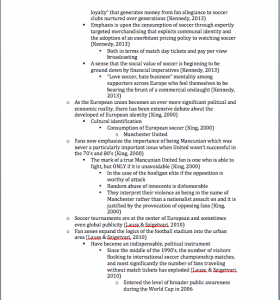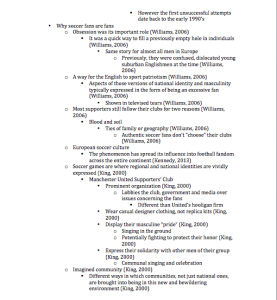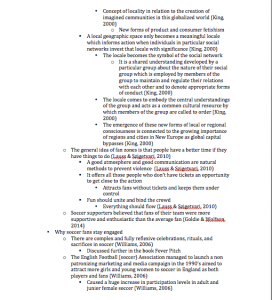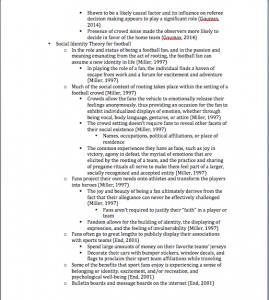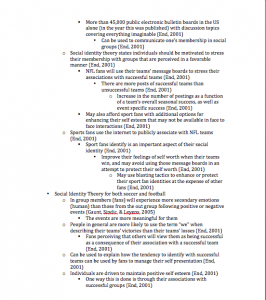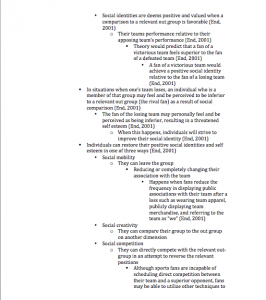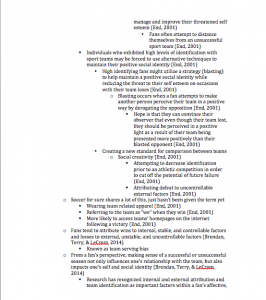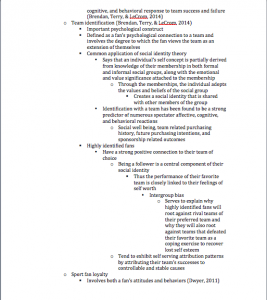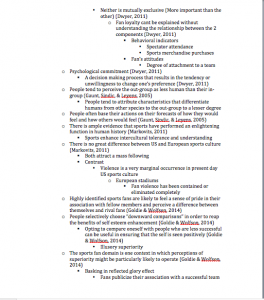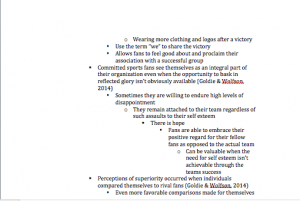This study examines the obsession fans have with profession football in America and professional soccer in Europe through the lens of Social Identity Theory. I am also exploring how the teams and organization capitalize on this obsession and use it to grow the obsession and fan base even more. In their research, Markovits, Miller, and Oates have connected fans of professional football with Social Identity Theory. This essentially states that professional football fans feel a sense of pride in their association with their favorite teams and being a follower of that team becomes a central component of their social identity that then becomes an extension of themselves. This theory helps to explain why fans are able to use their favorite teams to boost their individual self-esteem. I am also looking at the teams in America and how they use this theory to tend to fans’ obsessions and continue to build their fan base. I am curious to see if this theory can also be applied to the obsession that fans have with professional soccer in Europe and also if the organizations affiliated with professional European soccer teams use this theory to grow their fan base in a similar way that America does with football fans. I am hoping to use these two avenues to show how Social Identity Theory can explain the obsession that fans have from two different, but largely loved sports from two separate cultures.
Monthly Archives: February 2016
Shannon Renz/ Abstract
Shannon Renz
Abstract
February 25, 2016
In the United States, there is often a strong moral context in regard to creating and implementing public policy, this is especially true in regard to policies around IV drug users and needles exchanges. This is based on the understanding that IV drug users are deviant sinners who made and continue to make bad choices: it is the drug users own fault that they are IV drug users. This is strongly reflected in the municipal, county, and state policies in regards to needle exchanges and discussions of implementing them in communities where IV drug use and disease is rampant. Yet, some cities, such as New Haven and Chicago have overcome the challenges of moral objection, social norms and difficulty of policy to legalize needle exchanges. Prior to overcoming the policy barriers in particular cities, HIV/AIDS and heroin escalated to the point where it was becoming a public safety hazard. HIV/AIDS coalitions initiated the needle exchanges to promote safe blood with the understanding that clean needles resulted in cleaner blood which aided in the reduction of IV drug users and HIV/AIDS cases. This paper will use Conflict Theory as a lens to analyze the implementation of needle exchange programs and how changing social policy interrupts the social norms, order, and rules. IV drug users are not part of what society deems as a norm, hence they and the needles that they use are conflicts. Conflict Theory states that those who have the power are those who make the laws. IV drug users are not those who have power and they are unable to make laws or regulations because they are outside of the societal norm.
making laws and policies.
Abstract Draft #1
In the Citizens United v. Federal Election Commission Supreme Court case, the Supreme Court effectively stated “corporations are people”. This decision is controversial because the redefinition of corporations as people skews the original idea of Social Contract Theory. Social Contract Theory is based on the idea that individuals give part of their liberty to the government for the good of society in order to protect themselves and their property. However, the Citizens United v. FEC case is controversial in part because corporations have no defined role in Social Contract Theory. Despite the Supreme Court granting corporations the status of personhood, corporations do not enter into the Social Contract with the same role as human persons. The Supreme Court deeming corporations as people is controversial because it redefines our understanding of persons/human beings in a political context. This research will flesh out the role of corporations in the Social Contract.
Research Proposal
The definition of corporations in a political context has varied throughout American history. The Supreme Court most recently redefined corporations via the Citizens United v. Federal Election Commission case. This controversial case effectively said that “money is speech” and “corporations are people” which caused tension and division within the political community. I want to examine how corporations are defined in a political context via the lens of Social Contract Theory. This Supreme Court is controversial in part because corporations have no defined role in Social Contract Theory. Through my research, I hope to find how corporations will fit into Social Contract Theory and how they are defined in a political context.
My research statement will be viewed through the lens of Social Contract Theory for a theoretical framework. This theory burst onto the scene prior to the founding of the United States and was influential on the Founding Fathers drafting of the Constitution. This theory is certainly relevant in American political thought and the core elements of Citizens United case are provocative to say the least. The Citizens United case, which occurred in 2010, was decided on a contentious 5-4 vote and is still a topic of conversation years later. This research will help shed light on what the definition of a corporation is in a political context as well as why the Supreme Court reached the decision they did. This research will fall into the context of American politics and Constitutional Law. Again, this research is both relevant, applicable, and practical as a topic. This research will be conducted in a qualitative method by looking at the previous Supreme Court cases regarding corporate personhood. We will view the Constitution as a Living Document and examine the way the definition of corporations have shifted over time and how they impact the Social Contract.
Outline- Sarah Anderson
Research proposal
Dustin A Runyard
POL399 Capstone
Research proposal
The European Union (EU) and the North Atlantic Treaty Organization (NATO) are both international organizations that revolve around club goods theory. Club goods is an economic theory that assumes that there are mutually beneficial public goods that are offered by an organization. These goods could consist of national defense, monetary reforms, subsidies, liberalization of trade or developmental programs, which the latter could include civil and militarily. However, for the club goods theory to work within the frame work of the EU and NATO, these organization must have the following criteria. They must be a voluntary member, use exclusionary barriers for entry and in addition they use cost verse benefit analysis. The latter of the three requirements verges into the rational actor theory. This theory maintains that an actor or in this case the state is seeking to maximize their utility and will seek membership if the benefits outweigh the costs.
NATO and the EU maintain operations that are primarily considered as exclusionary international organizations made up of member states. However, given the special relationships with outside member states that receive benefits from the organizations how has NATO or the EU diminished their role as an exclusionary actor, while offering benefits to nonmember states including international collaboration between the EU and NATO respectively. The research that is being proposed is based off of the two theories discussed sequentially. The primary club goods theory will examine membership requirements, maintaining and retaining membership and the benefits that are exposed to member states. Furthermore there will be an examination with non-members states that receive assistance from NATO, which will include but not limited to security. The EU will be primarily be discussed as a club member that works within the paradigm. The research will try to prove that the traditional role of NATO has changed during the conclusion of the cold war drastically. The hypothesis maintains that the more members that have entered through the deepening process has decreased the effectiveness of NATO’s mission. Additionally, rational actors will not seek membership if there is no benefit that outweighs the cost. Likewise, spending resources on non-members decreases the benefits with joining the IO.
The purpose of the research is to validate that there is a complex environment in Europe. The European theater from the perspective form the US and its allies has maintained that stability in Europe is maintained by cooperative interdependence and shared interests. Furthermore there are echoes between both IOs that maintain standards, in particular three concepts are clearly stated for both IOs. Both envision democracy, market economy, and a version of fair humanitarian rights for minority groups. If there is a shift in the paradigm, this could also be interpreted as a potential identifier for more theories to build on, such as the relationship of power or theories based on relationships of interdependence.
Abstract- Sarah Anderson
This study examines the obsession fans have of professional football in America and professional soccer in Europe. Past research has connected fans of professional football with Social Identity Theory. I predicted that this could also be applied to the fans involved with professional soccer in Europe. Through my research I was able to determine that Social Identity Theory could be applied to both fans of the NFL as well as fans of professional European soccer (Markovits, 2011). Both the stadiums in Europe and media coverage in America use this theory to tend to fans’ needs and continue to build the best experience possible for fans around the world.
Research Proposal- Sarah Anderson
My study examines the comparison of the obsession fans have with professional football in America and the obsession fans have with professional soccer in Europe. It is important to see if countries with cultures that are comparable to ours also have the same type of fandom and if it can be applied to similar sociological theories. I will be using Social Identity Theory as my lens through which I will analyze my topic. This is a relevant lens because this theory has already been successfully applied to professional football and I think my research can expand on this and also apply this successfully to professional European soccer. I plan on answering this hypothesis by looking for similarities that football and soccer have with both the game and through the fans. Through my research and connections, I am hoping to understand more how this theory is used by both industries to ensure the best fan experience possible. This research is important in sociology because it covers such a broad population that almost everyone can relate to. My specific research was narrowed down to a very specific population, but I am confident that this information can be spanned across many demographics in the future.
Abstract
ABSTRACT
This research details the North Atlantic Treaty Organization (NATO) and the European Union (EU), regarding their formation and operations. Additionally, the research will address if their roles are diminishing through theoretical frame work of clubs theory and rational choice. NATO and the EU maintain operations that are primarily considered exclusionary international organizations made up of member states. However, given the special relationships with outside member states that receive benefits from the organizations, how has NATO or the EU diminished their role as an exclusionary actor, while offering benefits to nonmember states including international collaboration between the EU and NATO respectively? Both international organizations (IO) are operated as exclusionary actors that passed various benefits to members. However, due to fluctuations in global events, enlargements and deepening of policy reforms, the research also aims to identify elusive characteristics that might indicate a shift from their traditional roles. In particular, by addressing these questions there will be an emphasis in the post-cold war with the enlargements of the IOs. This paper will also discuss the mechanisms that both international organizations utilize. Furthermore, including exclusionary and membership policies, costs of maintaining a status within the IOs and how they provide common goods to their members.
Abstract
Abstract
Joel Balicki
This paper analyzes Poland’s national security policy regarding Russia, through the theoretical lens of Realism and Security Culture. The theoretical frameworks of Realism and Security Culture provide the most applicable framework to analyze the issue of nation-state security in Eastern Europe. Russia has always posed a significant national security threat to Poland. Recently, Putin’s Russia has encroached on Poland with the invasion of Georgia in 2008 and the invasion of Crimea in 2014. There is still a constant state of tension especially dealing with political, religious, and linguistic dissimilarities. Analysis of the Polish military and their security decisions is crucial in how Poland perceives itself in relation to its massive eastern neighbor.

